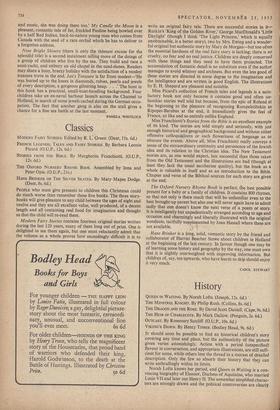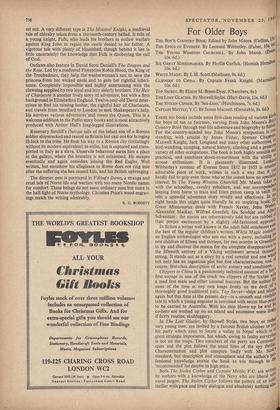History
QUEEN IN WAITING. By Norah Lofts. (Joseph, 12s. 6d.) THE MINSTREL KNIGHT. By Philip Rush. (Collins, 8s.- 6d.) VIKING'S DAWN. By Henry Treece. (Bodley Head, 9s. 6d.)
IT should soon be possible to find an historical children's story covering any time and place, but the authenticity of the picture given varies astonishingly. Action with a period (unspecified) flavour in conversation, and appropriate illustrations, are still suffi- cient for some, while others lose the thread in a morass of detailed description. Only the few so absorb their history that they can write enthrallingly within its limits.
Norah Lofts knows her period, and Queen in Waiting is a con- vincing biography of Eleanor, Duchess of Aquitaine, who married Louis VII and later our Henry II. The somewhat simplified charac- ters are strongly drawn and the political controversies are clearly set out. A very different type is The Minstrel Knight, a mediaeval tale of chivalry taken from a thirteenth-century ballad. It tells of a, young knight, Fulk, who leads his brothers in outlaw warfare against King John to regain the castle denied to his father. A vigorous tale with plenty of bloodshed, though behind it lies (a little uncertainly) the knowledge that Fulk is disobeying the call of God.
Outlaws also feature in David Scott Daniell's The Dragon and the Rose. Led by a mediaeval Florentine Robin Hood, the King of the Troubadours, they help the washerwoman's son to save the princess from her wicked uncle and to gain her rightful inheri- tance. Completely impossible and highly entertaining with the clowning supplied by two loyal and lazy elderly brothers. The Heir of Charlecote is another lively story of adventure, but with a firm background in Elizabethan England. Twelve-year-old David deter- mines to find his missing bother, the rightful heir of Charlecote, and travels from Stratford to London to seek Shakespeare's help. He survives various adventures and meets the Queen. This is a welcome addition to the Puffin story books and is most attractively produced with Arthur Hall's long-legged illustrations.
Rosemary Sutcliff's Outcast tells of the infant son of a Roman soldier shipwrecked and reared in Britain but cast out for bringing ill-luck to the tribe. He finds his way to a Roman city (irritatingly without its modern equivalent) to enlist, but is captured and trans- ported to Italy as a slave. Unservile behaviour earns him a place in the galleys, where the brutality is not minimised. He escapes eventually and again considers joining the Red Eagles. Well written, but somehow his allegiance to Rome does not ring true after the suffering she has caused him, and his British upbringing.
The dimmer past is portrayed in Viking's Dawn, a strange and cruel tale of Norse life and warfare with too many Nordic names for comfort. These beings do not seem ordinary men but more in the half-light of Norse mythology. Christine Price's wood engrav- ings match the writing admirably.
E. C. BUDGETT



























































 Previous page
Previous page